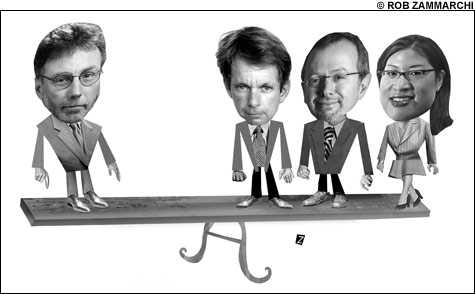
IN THE WORKS: The Globe is reportedly poised to unveil a redesigned front page in the next few weeks — another chance for front-page-enterprise editor Caleb Solomon to make his mark on the paper. |
To grasp the significance of the latest shake-up at the Boston Globe, consider this: the trio that just received key promotions — Brian McGrory, Caleb Solomon, and Shirley Leung — all spurned overtures from elsewhere.
McGrory declined the editorship of Boston magazine last year; this month, he gave up his metro column to become metro editor. Solomon had a chance to become Bloomberg News’s Boston-bureau chief; instead, he has a new job directing front-page enterprise coverage. And Leung, one of Solomon’s deputies, reportedly passed on opportunities at the New York Times and the Wall Street Journal to run the business section.
It hasn’t always worked this way. The Globe has seen a number of talented editorial staffers leave since the 2001 arrival of editor Marty Baron, who was hired from outside the paper: some quit the business, some got better jobs elsewhere, and some were pushed out. Whatever their individual strengths and flaws, their exits (which were accompanied by several rounds of buyouts) compromised the paper’s institutional memory. And they raised fears that the Globe — like the newspaper industry at large — was fading away.
Even more than the Globe’s recent Pulitzer, these three promotions signal the arrival (temporarily, at least) of some much-needed newsroom equilibrium. They also send a strong message about the Morrissey Boulevard status quo. Forget former editors Matt Storin and Tom Winship. Today’s Globe is very much Baron’s paper, both in terms of staff and sensibility.
Sizing ’em up
Taken in isolation, Leung’s promotion has the fewest subtexts of the three. At 34, Leung already has a potent résumé that includes reporting stints at the Globe, the Wall Street Journal, and the Baltimore Sun. Globe management was impressed by both her editing savvy and her energy: Solomon calls her a “whirlwind news-breaking machine.” Her plans for the section? Leung tells the Phoenix she’ll augment coverage of residential real estate, financial services, and nonprofits, and encourage more investigative work.
The McGrory hire is rifer with meaning. Opinions of his predecessor, Carolyn Ryan, vary markedly. With some exceptions, younger, less experienced staffers are more likely to praise Ryan’s passion and work ethic; older veterans are more likely to question her story selection and management techniques. But based on conversations with several current and former Globe staffers, both groups like the McGrory choice.
“Brian really is a young old-timer at the Globe,” one explains. “He has one foot in the new Globe, but he also has a solid connection to what I’d call the old Globe.”
“He knows Boston,” says another. “And I think people found it really compelling that he was willing to give up a great job as a columnist to do a much harder job with longer hours. I feel like he comes to this with a genuine interest in making the metro section better and boosting morale in the newsroom.”
Critics of McGrory’s column should remember two things. First, he amassed some impressive reporting experience at the Globe before becoming a columnist, covering Greater Boston and the White House and working as a roving national correspondent.
Second, the very tendency that occasionally hurt McGrory as a columnist — i.e., an inclination to cover Boston with a suburban mindset — reflects a broader mediating sensibility that could become an asset. Ideally, McGrory won’t just be a bridge between generations at the Globe. He’ll also bridge the conceptual gap between Boston and the suburbs, and serve as the public face of an institution that’s often seen as aloof.
“Whatever you think about his column, a lot of people in this community — whether they know him or not — feel like they have a relationship with the Globe through him,” says one ex-Globe staffer. “That’s a really important thing at this time in the Globe’s history.”
This is McGrory’s first editing position. He tells the Phoenix that today’s Globe is tighter and “punchier” than past iterations, and adds: “My goal now . . . is to connect more to people’s lives; to do less stories that are institutionally based and more stories that get into how people live.”
Fortunately, this seems like more than a euphemism for soft news. McGrory cites a May 18 piece by David Abel, on football coaches at Roxbury’s Madison Park High School who’ve seen three of their former quarterbacks murdered. “This was a reporter-generated idea,” McGrory says. “We went out at Abel’s instigation and got this whole story that humanizes what’s going on over in that part of the city.”
Front-page news
Solomon’s promotion is a bit of a cipher, since his new position, which was created expressly for him, has plenty of structural ambiguity. To begin with, Solomon will be relying on (and occasionally reshaping) material created by other editors’ reporters. And with Baron and executive editor Helen Donovan above him on the Globe totem pole, he may have less control over his new domain than he did as business editor. (Donovan has been the de facto managing editor since Greg Moore decamped for the Denver Post.)